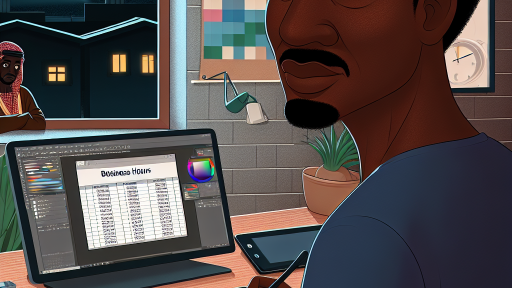Introduction
Freelancing cultural expectations involve the practice of working independently while adapting to the norms of various clients.
In Nigeria, freelancing has experienced significant growth in recent years.
The advancement of technology and the internet has made freelancing more accessible.
Many Nigerians are now exploring creative and professional opportunities online.
Nigerian society often holds strong cultural expectations regarding work.
Traditional beliefs emphasize the importance of formal employment and stability.
Many families value steady jobs in reputable companies.
Consequently, choosing to freelance can draw criticism from peers and relatives.
This cultural mindset can create tension for many aspiring freelancers.
Balancing these cultural expectations with personal career growth is essential for freelancers.
Pursuing a freelancing career often requires breaking societal norms.
It demands confidence in one’s abilities and a clear vision for the future.
Many freelancers face pressure to conform to traditional work paths, leading to self-doubt.
To thrive in freelancing, individuals must champion their choices and aspirations.
Freelancing offers flexibility and the potential for financial independence.
It allows individuals to explore their passions and develop diverse skill sets.
However, this independence may not always align with societal norms.
Freelancers often navigate misunderstandings and skepticism from family and friends.
Achieving harmony between cultural expectations and personal ambitions is a journey.
It involves clear communication with family members about career choices.
Setting boundaries and expectations can help improve understanding.
Freelancers should seek mentors and communities for support and guidance.
Shared experiences can mitigate feelings of isolation and encourage resilience.
Ultimately, balancing cultural expectations with career growth is vital for success in freelancing.
Individuals must stay true to their aspirations while navigating societal pressures.
With determination and perseverance, freelancers can carve their own paths.
Embracing this duality fosters personal fulfillment and professional achievement.
Understanding the Freelance Landscape in Nigeria
The freelance landscape in Nigeria has evolved significantly in recent years.
Various factors contribute to this growth, including the rise of the internet and increased accessibility to global markets.
According to a report by Statista, the Nigerian freelance market reached approximately $1 billion in 2022.
This upward trend indicates a promising future for freelancers.
Current Statistics and Trends in the Nigerian Freelance Market
Understanding market trends helps freelancers spot opportunities.
Below are some noteworthy statistics:
- Over 60% of Nigerian freelancers are under 35 years old.
- The average freelancer in Nigeria earns about $15 per hour.
- Remote work has grown by over 45% in the last three years.
- Nearly 80% of freelancers report satisfaction with their work-life balance.
- The majority of freelancers work between 20 to 40 hours per week.
These statistics highlight a vibrant market filled with young professionals eager to innovate.
The flexibility of freelancing attracts individuals who prefer controlling their work schedules.
As a result, the influx of fresh talent boosts various industries and fosters creativity.
Popular Freelance Industries in Nigeria
Different industries dominate the Nigerian freelancing scene.
Each sector offers distinct opportunities for growth.
Here are some popular freelance industries in Nigeria:
- Content Writing: Skilled writers produce articles, blogs, and web content for clients worldwide.
- Graphic Design: Creative professionals design logos, brochures, and social media graphics.
- Web Development: Programmers build websites and applications, catering to diverse client needs.
- Digital Marketing: Experts help businesses enhance online presence through social media and SEO strategies.
- Virtual Assistance: Freelancers provide administrative support to companies and entrepreneurs.
These industries not only provide massive opportunities but also encourage individuals to develop their skills.
Many freelancers specialize in multiple areas, which increases their marketability.
As creativity flows, Nigeria continues to produce exceptional talents recognized on international platforms.
Platforms Commonly Used by Nigerian Freelancers
Freelancers rely on various online platforms to find job opportunities.
These platforms connect professionals with clients globally.
Here are some of the most popular freelance platforms:
- Upwork: This is a widely used platform that connects freelancers with clients seeking various services.
- Fiverr: Fiverr allows freelancers to offer their services starting at $5.
It’s popular for creative gigs. - Freelancer: Freelancer hosts contests and projects, allowing freelancers to bid for jobs.
- Guru: Guru integrates various payment options and showcases freelancers’ portfolios.
- PeoplePerHour: This platform allows freelancers to find projects by hourly rate or fixed price.
These platforms create a marketplace where freelancers can showcase their skills.
They also establish connections with clients, leading to potential long-term relationships.
Furthermore, many of these platforms provide resources to help freelancers improve their skills.
As the freelance market flourishes in Nigeria, cultural expectations play a significant role.
Understanding and reconciling these expectations with career aspirations is essential for success.
Traditional career paths are still highly regarded, influencing choices among young professionals.
Freelancers may face challenges stemming from societal pressure.
Many families view stable employment as a sign of success, whereas freelancing often appears uncertain.
Balancing personal aspirations with family expectations requires commitment and resilience.
However, increased awareness and success stories of Nigerian freelancers are slowly shifting this perception.
Education plays a pivotal role in advancing the freelance community in Nigeria.
Many universities and institutions offer courses focused on freelancing skills.
Online courses and workshops enhance the learning experience and foster self-improvement.
Organizations that support freelancers are also emerging, creating networks to share knowledge.
Thriving in Nigeria’s Freelance Landscape
Networking remains crucial for freelancers.
Engaging with fellow professionals opens up avenues for collaboration.
Attending workshops, seminars, and virtual meetups fosters community and encourages skill development.
This collective effort strengthens the freelance ecosystem, paving the way for growth.
Adapting to technological advancements is necessary for success.
Freelancers must stay updated on industry trends and tools.
Utilizing project management software enhances productivity, ensuring timely delivery of projects.
Investing time in learning new skills remains pivotal for career growth.
Basically, the freelance landscape in Nigeria offers immense potential.
With rising statistics, diverse industries, and accessible platforms, many young professionals are embracing freelancing.
By balancing cultural expectations with career aspirations, they can carve out successful paths.
The future looks bright for freelancers ready to navigate this exciting terrain.
Cultural Expectations and Their Implications
Nigerian culture emphasizes certain traditional career paths deeply rooted in history.
These paths include fields like civil service, healthcare, and law.
Families often invest in education, hoping their children will secure stable government jobs.
Civil service roles, in particular, symbolize prestige and financial security.
Many families praise doctors and lawyers, viewing them as the ideal choices.
However, these cultural values can complicate the journey of freelancers navigating the professional landscape.
Exploration of Traditional Career Paths Valued in Nigerian Culture
In Nigeria, traditional career paths dominate societal expectations.
These preferred options often include:
- Civil Service: Considered a prestigious career, it provides job security and benefits.
- Healthcare: Doctors and nurses earn respect due to their essential roles in society.
- Law: Lawyers enjoy high status and respectable income, making this avenue appealing to many.
- Engineering: Engineers contribute significantly to national development and infrastructure.
- Education: Teachers inspire future generations and are valued within many communities.
These career options are seen as guarantee paths to success.
They resonate with many families aiming for upward mobility.
Because of this cultural backdrop, individuals pursuing freelance careers face numerous hurdles.
Many deviating from the norm encounter skepticism and disapproval.
Challenges Freelancers Face Due to Societal Perceptions
Freelancers often experience a unique set of challenges.
These challenges arise from societal perceptions and cultural values.
They may include:
- Invalidation of Freelancing: Many people see freelancing as a less legitimate career choice.
This perception diminishes the freelance profession’s value. - Financial Concerns: Freelancers often face unpredictable income, leading to fears.
Families may equate income stability with traditional careers. - Lack of Understanding: Many Nigerians do not fully understand freelancing.
This lack of awareness limits validation of freelancing as a viable career path. - Family Pressure: Family members often encourage traditional professions, creating stress.
Freelancers may feel compelled to conform to expectations. - Social Isolation: Freelancers might face isolation from peers.
The divergence from traditional paths can lead to alienation.
These challenges can create a disheartening environment for freelancers.
Consequently, individuals may struggle to pursue their passions in an unwelcoming landscape.
The Stigma Associated with Freelancing in Certain Communities
Stigma surrounding freelancing can hinder career growth in Nigeria.
Many communities associate freelancing with instability and risk.
As a result, this can lead to negative stereotypes.
Freelancers frequently confront judgmental comments from family and friends.
These stereotypes often include:
- Lazy Perception: Freelancers may be viewed as lacking ambition.
The false belief is that they choose easy, carefree lives. - Unprofessional Image: People may see freelancers as unprofessional or unreliable.
This belief can impact a freelancer’s ability to secure clients. - Financial Instability: The erratic nature of freelancing income can discourage societal acceptance.
Many consider freelancers financially irresponsible. - Limited Growth Opportunities: Some believe that freelancers have few opportunities to grow.
This belief can deter others from considering freelancing as a career.
The stigma associated with freelancing can have a psychological impact.
Many individuals internalize this stigma, leading to self-doubt.
They may question their capabilities or worth, even in an evolving market.
Strategies for Navigating Cultural Expectations
Despite these challenges, Nigerians can thrive in freelancing while respecting cultural values.
It is essential to develop strategies to navigate societal expectations.
Some effective strategies include:
- Educating Families: Freelancers can inform family members about the freelance economy.
They can share success stories of Nigerian freelancers thriving globally. - Building Networks: Creating connections with like-minded individuals can provide support.
These networks foster an understanding of the freelance lifestyle. - Professional Development: Continuous learning can help freelancers build credibility.
Completing courses and acquiring certifications can elevate their careers. - Balancing Expectations: Freelancers can blend cultural values with their career choices.
They can demonstrate success while respecting family traditions. - Sharing Achievements: Regularly showcasing accomplishments can help change perceptions.
Celebrating successes fosters a positive view of freelancing.
Successfully navigating cultural expectations requires patience and resilience.
It involves balancing personal aspirations with family values.
As freelancing gains traction in Nigeria, societal perspectives will gradually evolve.
In essence, cultural expectations significantly influence the freelancing landscape in Nigeria.
While the traditional career paths dominate societal views, freelancers continue to carve out their niche.
By addressing challenges and overcoming stigma, they can create fulfilling careers.
The emerging freelance culture challenges the norm, showcasing diverse career possibilities.
As perceptions shift, the acceptance of freelancing will grow, paving the way for future generations.
Read: Achieving Work-Life Balance as a Freelancer in Nigeria
Benefits of Freelancing in Nigeria
Freelancing in Nigeria offers numerous advantages.
These benefits especially appeal to professionals seeking to balance personal and career growth.
Understanding these benefits can motivate many to explore freelancing opportunities.
Flexibility and Work-Life Balance
One of the standout benefits of freelancing is flexibility.
Freelancers enjoy the freedom to choose their working hours.
This flexibility enables individuals to balance personal responsibilities with professional duties.
Many Nigerian freelancers work from home, allowing them to create a comfortable work environment.
Being able to set their schedules gives freelancers the power to prioritize.
They can attend family events or personal engagements without stress.
This adaptability contributes to improved mental well-being.
Freelancers report higher job satisfaction compared to traditional employees.
Furthermore, working remotely reduces commuting time.
Therefore, freelancers gain extra hours each week to pursue hobbies or relax.
This balance not only improves productivity but enhances overall quality of life.
Freelancers often enjoy a better work-life integration, enhancing both personal and professional aspects.
Financial Opportunities and Potential for Higher Earnings
The financial landscape for freelancers in Nigeria is promising.
Many freelancers have reported increased earnings compared to traditional jobs.
This income potential stems from the ability to set competitive rates for their services.
The more skills freelancers acquire, the higher their earning capacity.
Nigeria’s growing gig economy creates diverse opportunities.
Freelancers can work across various industries, such as tech, design, and writing.
This diversification allows them to tap into multiple income streams.
With the right strategies, earning significantly more than a regular salary is possible.
Furthermore, freelancers can scale their businesses.
They can expand their service offerings or take on more clients as their skills improve.
This scaling ability opens doors to even higher income.
Many freelancers successfully transition into agency models over time, maximizing their income potential.
Ability to Work with International Clients and Exposure to Global Markets
Freelancing also brings exposure to international clients.
The internet eliminates geographical boundaries, making it easier for Nigerians to connect globally.
This access allows freelancers to work with clients from various countries.
Working with international clients enhances their skills and broadens their network.
Freelancers gain valuable insights into different markets.
They learn about various cultures and business practices, improving their adaptability.
This exposure places them in a better position to compete.
They can leverage these experiences to attract clients both locally and internationally.
Additionally, international clients often pay higher rates for quality work.
Freelancers can tap into lucrative markets, enabling financial growth.
Working on diverse projects enhances their portfolios.
As a result, freelancers in Nigeria can showcase international experience to future clients.
Creative Freedom and Skill Development
Another significant benefit of freelancing is creative freedom.
Freelancers often choose projects that resonate with their interests.
This autonomy fosters innovation and inspires creativity.
This newfound freedom leads to more fulfilling work experiences.
Moreover, freelancers constantly encounter new challenges.
These challenges encourage continuous skill development.
Freelancers learn new tools, techniques, and trends in their respective fields.
This continuous learning keeps their skills relevant and competitive.
Through diverse projects, freelancers enhance their problem-solving abilities.
They often face unique project requirements that push them to think critically.
As they navigate these challenges, they strengthen their expertise, making them invaluable assets in their industries.
Networking and Community Building
Freelancing facilitates networking opportunities.
Many freelancers join online communities and platforms to connect.
These networks provide support and knowledge-sharing among peers.
Being part of a freelancer community fosters collaboration and mentorship.
Networking leads to referrals and potential partnerships.
As freelancers build relationships, they can attract new clients through word-of-mouth.
Collaboration with other freelancers can also lead to joint projects, expanding their service offerings.
Additionally, exposure to diverse perspectives enriches their work.
Freelancers learn different ways to approach tasks, enhancing creativity.
A strong network can also provide emotional support during challenging times.
Independence and Autonomy
Freelancers experience a level of independence not found in traditional jobs.
They can make choices about their workloads and client selection.
This autonomy fosters a sense of ownership over their careers.
Freelancers can define their professional paths.
They are not bound by company policies or bureaucratic procedures.
This independence allows for quicker decision-making and adaptability.
Freelancers can pivot and explore new opportunities as they arise.
This autonomy empowers them to pursue their passions.
They can specialize in areas that intrigue them, leading to greater job satisfaction.
Overall, this independence contributes to personal and professional fulfillment.
Freelancing in Nigeria comes with many benefits.
These advantages make it an attractive option for many professionals.
Understanding the potential for flexibility, financial growth, and global exposure can inspire others to explore freelancing opportunities.
As the gig economy continues to grow, the advantages of freelancing will likely expand, offering more opportunities for success and fulfillment.
Read: The Nigerian Freelancer’s Manual for Managing Workloads

Strategies for Balancing Cultural Expectations with Freelancing
Freelancing offers flexibility and independence.
However, cultural expectations can create significant challenges.
In Nigeria, traditional norms often prioritize stable jobs over freelancing.
This perception can lead to misunderstandings regarding the legitimacy of freelance work.
Therefore, freelancers need effective strategies to navigate these cultural contexts successfully.
Building a Supportive Network of Like-Minded Individuals
Creating a supportive network is essential for freelancers seeking balance.
Such a network provides encouragement and practical advice.
Here are ways to build this network:
- Join Online Communities: Platforms like Facebook and LinkedIn host groups for freelancers.
Engaging with these communities can lead to valuable connections. - Attend Local Meetups: Look for local freelancer meetups.
These can foster relationships with individuals facing similar challenges. - Find a Mentor: A mentor can provide guidance and moral support.
Look for someone with established experience in freelancing. - Collaborate on Projects: Working with other freelancers can enhance skills.
Collaboration also creates a sense of community. - Participate in Workshops: Many organizations offer workshops tailored for freelancers.
Attending these can build both skills and networks.
Through these connections, freelancers find empathy and strategies to overcome cultural barriers.
Sharing experiences encourages resilience and innovation in problem-solving.
Educating Family and Community about the Benefits of Freelancing
Education plays a crucial role in shifting perceptions about freelancing.
By informing family and community members, freelancers can foster understanding and support.
Here are several strategies freelancers can employ:
- Share Success Stories: Highlight stories of successful freelancers.
Showcasing tangible results can demonstrate the viability of freelancing. - Discuss Financial Independence: Freelancers often enjoy greater financial flexibility.
Discussing this aspect can help family understand the value of freelancing. - Highlight Varied Career Opportunities: Freelancing encompasses many fields, from writing to graphic design.
Sharing this breadth can shift narrow views of a ‘real job.’ - Explain Work-Life Balance: Freelancers often achieve a better work-life balance.
Emphasizing this benefit can resonate with family priorities. - Use Statistics: Presenting data on the growth of freelancing can validate its importance in the economy.
This can help shift perceptions from skepticism to acceptance.
By educating those around them, freelancers can change longstanding cultural expectations.
Finding common ground and open dialogue is crucial for success in this endeavor.
Establishing a Professional Online Presence to Enhance Credibility
In the digital age, a strong online presence is vital for any freelancer.
A professional image can help mitigate stereotypes associated with freelancing.
Here are strategies to establish credibility online:
- Create a Professional Website: A well-designed website serves as a portfolio.
It showcases work and demonstrates professionalism. - Utilize Social Media: Platforms like LinkedIn enhance networking opportunities.
Regularly sharing insights and achievements can boost visibility. - Participate in Forums: Engaging in discussions on platforms such as Quora can showcase expertise.
Sharing knowledge builds reputation and credibility. - Request Client Testimonials: Positive feedback from clients enhances credibility.
Sharing testimonials on a website can attract new opportunities. - Showcase Achievements: Regularly update online profiles with accomplishments.
Showcasing awards or recognition builds trust with potential clients.
A strong online presence reflects professionalism.
It conveys to family and the community that freelancing is a legitimate career choice.
By enhancing credibility, freelancers chip away at cultural stigmas.
Balancing cultural expectations with freelancing in Nigeria is challenging yet achievable.
Building a supportive network provides essential backup.
Educating family and community fosters understanding.
Establishing a credible online presence solidifies the freelancer’s legitimacy.
Through these strategies, freelancers can thrive academically and socially, creating a balanced life.
Read: Navigating Freelancing Challenges in Nigeria with Balance
Skills Development for Career Growth
Freelancing demands that professionals constantly update their skills.
In Nigeria, where the freelance economy is growing, skills development is crucial for career progression.
The competitive landscape pushes freelancers to enhance their capabilities and adapt to changing demands.
As a freelancer, you must stay informed about industry trends and advances in technology.
Importance of Continuous Learning and Skill Enhancement
Continuous learning is vital for freelancers in Nigeria.
It enables them to remain relevant and improve their marketability.
Here are several reasons why skill enhancement is necessary:
- Stay Competitive: The more skills you acquire, the more valuable you become to clients.
- Adapt to Technological Changes: The digital world evolves rapidly.
Embracing new technologies can help you stay ahead. - Expand Service Offerings: Learning new skills means broadening your service portfolio, which attracts diverse clients.
- Increase Earnings: Higher skill levels often lead to better-paying jobs.
Companies pay top dollar for qualified freelancers. - Boost Confidence: Gaining new skills enhances your self-esteem.
Confidence leads to bolder career moves.
Investing in personal and professional growth is essential for success.
Whether you want to improve your writing, graphic design, or programming skills, the right resources can make all the difference.
Recommended Online Courses and Resources for Nigerian Freelancers
Numerous online platforms offer courses tailored to freelancers.
Below are some recommended resources to help you enhance your skills:
- Coursera: Provides access to courses from universities worldwide.
Subjects include business, computer science, and personal development. - Udemy: Features a wide array of courses, often at discounted prices.
You can learn about digital marketing, graphic design, and coding. - LinkedIn Learning: Offers courses focused on business skills and professional development.
Networking on LinkedIn can also lead to collaborations. - Skillshare: Focuses on creative skills like photography, writing, and design.
Its community-driven approach fosters idea exchange. - Google Digital Garage: Provides free courses on digital marketing and data analytics.
These are essential skills for today’s freelancers. - Khan Academy: Offers free educational resources on various subjects.
It’s beneficial for enhancing basic skills and knowledge. - edX: Collaborates with top institutions.
Provides courses in multiple disciplines including technology and entrepreneurship.
The availability of these resources makes it easy for freelancers to acquire new skills.
Moreover, many offer flexible schedules that accommodate a freelancer’s unpredictable workload.
Networking Opportunities and Their Role in Professional Development
Networking plays a crucial role in career growth.
Establishing relationships with other professionals can lead to numerous opportunities.
Here are ways to effectively network as a freelancer in Nigeria:
- Social Media: Use platforms like LinkedIn, Twitter, and Facebook to connect with industry peers.
- Online Communities: Join forums or Facebook groups relevant to your freelance niche.
Sharing experiences and advice can enhance your skills. - Attend Workshops and Conferences: Whether online or in-person, they provide excellent networking opportunities.
Engaging with leaders in your field can yield valuable insights. - Collaborate with Fellow Freelancers: Working on joint projects can expand your skills and reach.
These partnerships may lead to larger contracts. - Local Meetups: Find local freelance meetups or business gatherings.
Engaging with local professionals fosters relationships and builds community.
Networking does not end once you meet someone.
Maintain these relationships by following up with contacts, sharing your work, and assisting others.
Building a support system helps you grow both personally and professionally.
Investing time in networking pays off.
You gain insights, learn about job openings, and find mentorship opportunities.
The freelance journey can be lonely, yet connecting with others provides encouragement and motivation.
In fact, the pathway to successful freelancing in Nigeria involves continuous skill development and effective networking.
By committing to lifelong learning, freelancers can stay relevant in a competitive market.
Utilize online courses and resources to enhance your skill set.
Furthermore, embrace networking to establish valuable connections that propel your career forward.
Balancing cultural expectations with professional growth requires dedication and strategic planning.
Ultimately, your commitment to self-improvement and relationship-building will facilitate career success as a freelancer in Nigeria.
Read: Stay Sane while Freelancing: Tips for Nigerians
Case Studies and Success Stories
Freelancing is not just a trend; it represents growth, empowerment, and the breaking of cultural barriers.
In Nigeria, many talented individuals have embraced freelancing, forging their paths despite societal expectations.
This section highlights successful Nigerian freelancers who have excelled in their careers while balancing cultural norms.
Profiles of Successful Nigerian Freelancers
Several Nigerian freelancers have captured the essence of dedication, hard work, and adaptability.
Here are a few inspiring profiles:
- Chinonso Okeke: Graphic Designer
- Tolu Adebayo: Content Writer
- Emeka Nwachukwu: Software Developer
- Fatimah Ibrahim: Digital Marketing Consultant
Lessons Learned and Strategies Implemented
These successful freelancers share common themes and strategies that led to their accomplishments:
Emphasis on Skill Development
Continuous learning played a crucial role in their success.
Chinonso took online courses to enhance his graphic design skills, while Emeka honed his programming through various coding boot camps.
Networking and Community Building
Building a strong network was essential for these individuals.
Tolu connected with other writers through online forums, exchanging ideas and securing new clients.
Flexibility and Adaptability
Successful freelancers adapted to the changing demands of their industries.
Fatimah adjusted her strategies based on market trends to ensure her clients achieved real results.
Balancing Personal and Professional Life
Each freelancer mastered the art of balancing their responsibilities.
Emeka set strict work hours to dedicate to his family while also meeting client deadlines.
Leveraging Technology
They effectively used technology to enhance productivity.
Chinonso utilized design software and freelance platforms to showcase his work and attract clients.
Building a Personal Brand
All the profiles emphasize the importance of creating a personal brand.
Fatimah, for instance, utilized social media to establish herself as a thought leader in digital marketing.
The Impact of Their Work on Their Communities and Families
The successes of these individuals ripple throughout their communities and families, fostering growth and inspiration:
Job Creation
As these freelancers grow, they often create job opportunities.
Emeka has begun mentoring young developers, passing on his knowledge and skills.
Encouraging Entrepreneurship
Fatimah inspires many local businesses to embrace digital marketing.
Her efforts have helped numerous startups establish an online presence and thrive.
Community Development
Chinonso initiated a community art program, teaching graphic design skills to youth.
His initiative empowers the next generation of artists.
Supporting Families
Tolu’s freelance writing career has given her family financial stability.
This stability allows her to invest more in her children’s education and well-being.
Promoting Cultural Awareness
Each freelancer integrates their cultural background into their work.
Their unique perspectives contribute to a richer representation of Nigerian culture in their respective fields.
The stories of these Nigerian freelancers represent a growing shift in how individuals approach work and societal expectations.
By embracing freelancing, they navigate cultural norms while establishing rewarding careers.
Their journeys reveal essential strategies for balancing personal aspirations with cultural responsibilities.
More importantly, they inspire others to explore freelancing as a viable career path.
As more individuals follow suit, the ripple effect in communities can lead to broader societal transformation.
It’s clear that freelancing, coupled with cultural adaptability, holds the potential to reshape narratives in Nigeria.
Conclusion
Balancing cultural expectations with career ambitions is vital for aspiring freelancers in Nigeria.
The journey of freelance work allows individuals to explore their passions while supporting their families.
However, societal pressures often complicate this path.
Many still view traditional jobs as the only measure of success.
Yet, freelancing can provide financial stability and personal fulfillment.
Embracing a freelance career means stepping outside conventional norms.
This shift opens doors to innovation and creativity.
Nigerian freelancers can contribute significantly to the economy and influence global trends.
As they build their brands, they show resilience against societal stereotypes.
They become examples of how diverse career choices can lead to success.
Moreover, aspiring freelancers must recognize their worth in the job market.
Their unique skill sets are valuable assets that deserve acknowledgment.
Whether in graphic design, writing, or tech development, freelancers can achieve remarkable growth.
They just need to stay committed and adapt to the ever-changing landscape.
Families and communities need to support these ambitions.
Society must shift its perceptions to embrace freelancing as a legitimate career choice.
Encouraging discussions around different career paths will slow stigmatization.
When people see freelancing positively, more individuals will pursue their passions freely.
As a collective, we must advocate for this change.
We can foster environments that celebrate diverse career achievements, including freelancing.
Encouragement and acceptance from society will empower freelancers to reach their fullest potential.
In short, the journey of freelancing in Nigeria is a testament to courage and innovation.
Aspiring freelancers should embrace their chosen paths despite cultural pressures.
By standing firm in their ambitions, they can inspire a new wave of acceptance and growth.
Let us champion freelancing and redefine success together.




